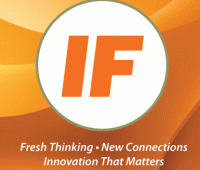Dedicated to relinquishing responsibility for learning to the students
I think the most valuable thing I got out of this was to change the perception of my job from "information dispenser to "designer of learning environments." I really enjoyed it. I usually get online to look for jobs in other fields during inservice, but I didn't do that once during your workshop. I am actually exited about using this information.

Creating is Bloom’s highest level of thinking. Creating is not limited to “the creative.” We all create when we make new combinations of existing elements. Someone put wheels on the bottom of a scaled-down surfboard and created the skateboard. And so it goes…
While teachers and students are constrained by mind-numbing test prep, the rest of society is working overtime to foster creative connections. In September the annual “IdeaFestival” was held in Louisville, KY. It brings together creative thinkers from different disciplines to connect ideas in science, the arts, design, business, film, technology and education. The festival motto – “If it can possibly go together, it comes together here.” Why not apply that perspective in our schools?
Here are some suggestions from the festival on how to come up with new ideas. Many can be easily adapted to help our students discover their creative potential in the classroom.
“Education and the Next President,” a debate between Linda Darling-Hammond, education advisor to Senator Barack Obama, and Lisa Graham Keegan, education advisor to Senator John McCain, which will be held at Teachers College in the Cowin Conference Center on Tuesday evening, October 21st, 2008, at 7 pm. TC President Susan H. Fuhrman will moderate. You will be able to view a live Webcast of the debate at www.tc.edu/edadvisorsdebate starting at 7 pm on the 21st of October. The Webcast will be archived for subsequent viewing on iTunes U the following day.
(You might also enjoy a lively discussion on the subject broadcast on the Diane Rehm show on October 21.)
Obama and McCain managed to squeeze in a few minutes on educational policy into final debate. Isn’t it about time we heard more about their educational policies?